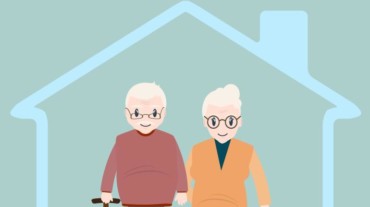
When it comes to ageing, one faces a lot of physical issues. Arthritis is one of them. It is characterised by the swelling of one or more joints which causes severe pain and stiffness. Honestly, the definition of it can barely explain the actual amount of discomfort it causes someone suffering from it.
If you have older people in your family, perhaps your dad or nani, who have been diagnosed with arthritis—you know that apart from the pain, it causes a restriction in movement as well which can affect mental health. In fact, after a point, the unbearable pain along with limited mobility can affect the quality of life of the person suffering from arthritis, causing frustration.
Hence, it is extremely important to manage this condition in a way that life is as comfortable as possible. Here are four simple ways in which you can help the elders in your family suffering from arthritis to live a life of dignity and comfort:
1. Help them with some amount of physical activity
While physical activity will be restrained, it has to be a part of their routine at least two to three times a week. It doesn’t have to be a complicated routine but something light like yoga or walking. According to John Hopkins Arthritis Center, “Regular physical activity can keep the muscles around affected joints strong, decrease bone loss, and may help control joint swelling and pain.”

They might need help with it and you have to be there to not just support them but also encourage them. While physical activity is important to keep the body healthy, arthritis is a condition that limits it. Hence, it has to be ensured by you, as a caregiver, that they include it in their routine and keep motivating them.
2. Help them manage pain, but in a natural way
When someone is diagnosed with arthritis, it is a given that pain and inflammation will be a regular part of their life. But learning how to manage it can make things better. There are natural ways to manage arthritis pain and inflammation.
For starters, a hot and cold approach can be a beneficial one. While hot showers and electric blankets can help with stiffness and discomfort, a cold compress can soothe inflamed areas.
In fact, the Arthritis Foundation talks about the particular benefits of heat therapy and mentions that “When you warm up a sore joint or tired muscle, your blood vessels get bigger. This allows more blood, oxygen, and nutrients to be delivered to the injured tissues. Better circulation means more relaxation for those stiff muscles and joints.”
3. Notice what they’re struggling with and offer help before they have to ask for it
Asking help isn’t easy for anyone, especially for someone who has lived life independently. But, someone with arthritis will eventually require help with day-to-day activities. For example, see if they need help with walking and are open to using tools like a cane or walker.

It is also important to figure out where to draw the line when it comes to helping because they might want to do some activities on their own, or will take time to mentally accept that they will require assistance.
Select Topics of your interest and let us customize your feed.
PERSONALISE NOW4. Help them manage their weight
An increase in body weight puts extra stress on the joints. Arthritis is, to begin with, responsible for restricted movement and gaining weight will only add to that restriction which can make things quite frustrating as well as painful for the one suffering from it.
That’s why you need to make sure they eat right and healthy to ensure that no drastic weight gain takes place. For this, you can begin by monitoring their diet at home but you can always schedule that appointment with a nutritionist on their behalf if you feel it is needed.